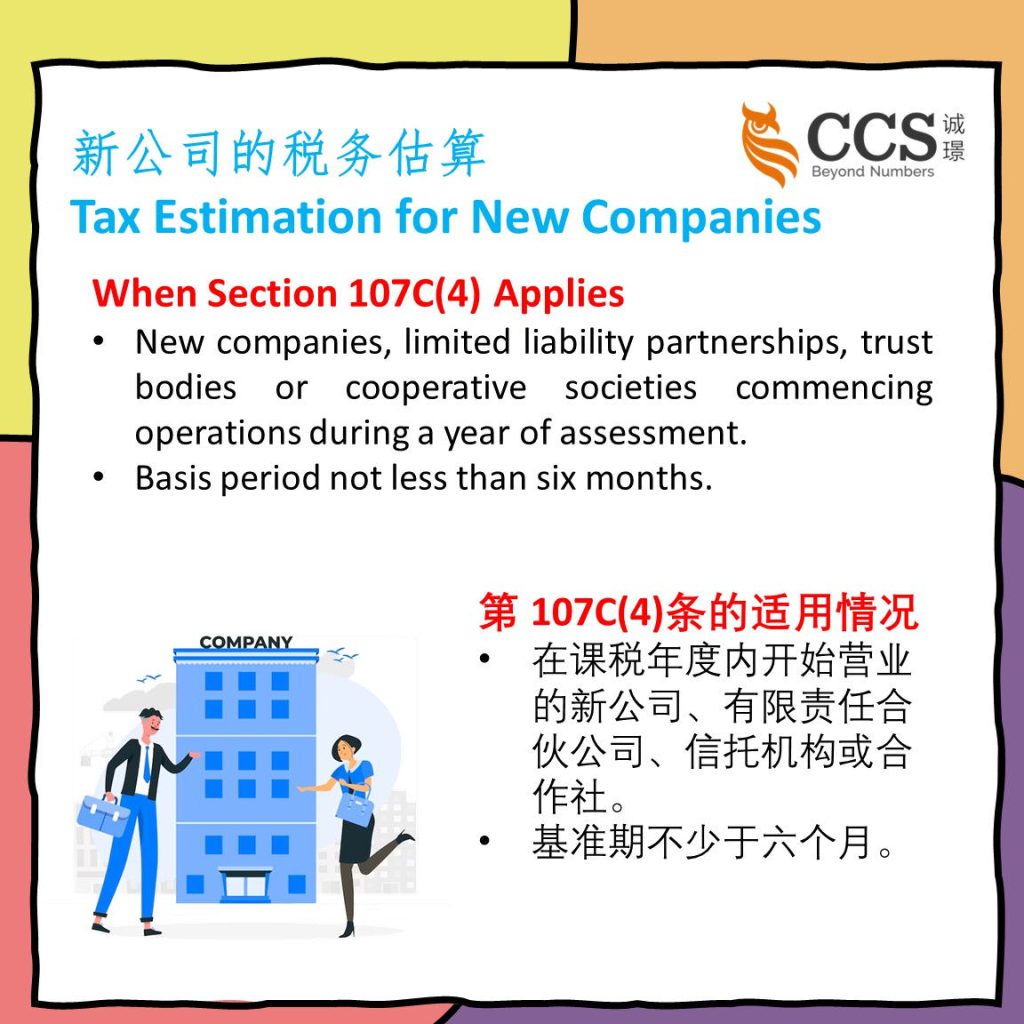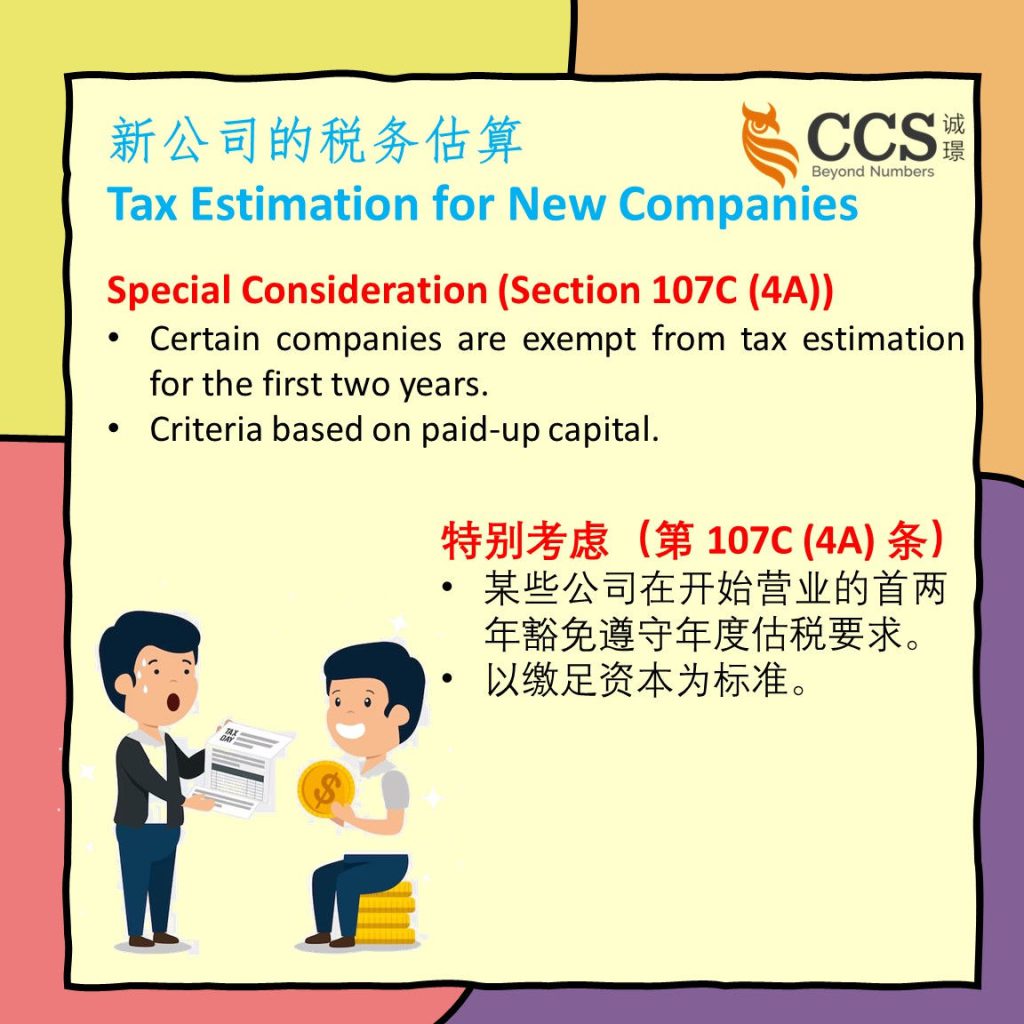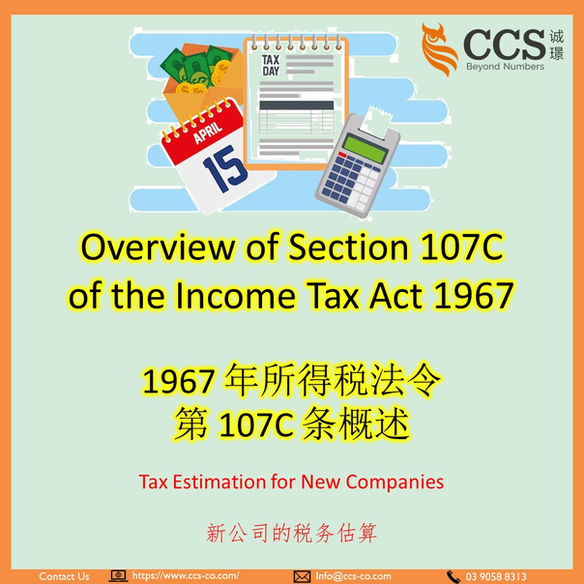Section 107C of the Malaysian Income Tax Act 1967 outlines the rules and procedures for companies, limited liability partnerships, trust bodies, and co-operative societies to estimate their tax payable and make payments by instalments.





Here’s a summary of the key points from this section:
1. **Annual Estimate**: Every company, limited liability partnership (LLP), trust body, and co-operative society must estimate their tax payable for each year of assessment to the Director General (subsection 107C(1)).
2. **Timing and Form**: The estimate of tax payable should be made in the prescribed form and submitted to the Director General not later than thirty days before the beginning of the basis period for that year of assessment (subsection 107C(2)).
3. **Minimum Estimate**: The estimate should not be less than 85% of the revised estimate of tax payable for the immediately preceding year of assessment, or if no revised estimate is furnished, it should be at least 85% of the estimate for the immediately preceding year (subsection 107C(3)).
4. **New Companies**: For new companies (other than a company to which subsection (4A) applies), limited liability partnerships, trust bodies, or co-operative societies commencing operations during a year of assessment, there are specific requirements and timeframes for providing estimates (subsection 107C(4)). Section 107C(4) Explanation:
When a company, limited liability partnership, trust body, or co-operative society starts operating in a year of assessment, and the basis period for that year is not less than six months, Section 107C(4) comes into play.
This section establishes two key requirements for these new entities:
a) The estimate of their tax payable for that year of assessment should be made in the prescribed form and furnished to the Director General within three months from the commencement date of operations.
b) Subsections (2) and (3) of Section 107C (which pertain to the timing and minimum estimate) shall apply to the company beginning from the second year of assessment.
Illustrative Example:
Let’s say a new company in Malaysia, XYZ Sdn Bhd, started its operations on 1 April 2023.
This is the beginning of its basis period for the year of assessment 2023.
Here’s how Section 107C(4) would apply to XYZ Sdn Bhd:
- XYZ Sdn Bhd must estimate its tax payable for the year of assessment 2023 and furnish this estimate to the Director General by July 1, 2023 (within three months from the date of commencement of operations).
- For the year of assessment 2023, the estimate of tax payable provided by XYZ Sdn Bhd should meet the requirements specified in Section 107C(2) and Section 107C(3).
- In subsequent years (beginning with the year of assessment 2024), XYZ Sdn Bhd will follow the standard procedures for estimating tax payable as outlined in Section 107C, including adhering to the timing and minimum estimate rules.
This ensures that new companies have specific guidelines for estimating their tax liabilities when they commence operations during a year of assessment, and it also sets the groundwork for their tax estimation procedures in the following years.
5. **Monthly Instalments**: When an estimate is furnished, the tax amount is to be paid in equal monthly instalments based on the number of months in the basis period (subsection 107C(5)).
6. **Revised Estimates**: Companies can provide revised estimates during the sixth or ninth month of the basis period, and the payment is adjusted accordingly (subsection 107C(7)).
7. **Electronic Submission**: Estimates or revised estimates must be submitted electronically (subsection 107C(7A)).
8. **Director General’s Discretion**: The Director General may direct companies, limited liability partnerships, trust bodies, and co-operative societies to make payments by instalments and can also remit amounts under certain circumstances (subsection 107C(8) and subsection 107C(11)).
9. **Penalties**: Failure to pay instalments on time can result in penalties (subsection 107C(9)).
10. **Tax Recovery**: In cases where tax payable under an assessment exceeds the estimate by more than 30%, additional penalties may apply (subsection 107C(10)).
11. **Penalty**: This subsection outlines a penalty if they fail to estimate their tax payable, and no prosecution under Section 120 has been instituted against them for this failure. In such cases, the tax payable is increased by a sum equal to 10% of the tax payable, and this additional sum is recoverable as if it were tax due and payable under the Act. The provision encourages companies to comply with the tax estimation requirement and avoid penalties. (Section 107C(10A))
12. **Tax Collection**: Nothing within Section 107C shall prevent tax collection from a person to whom this section applies. The tax collection can proceed per Section 103, and the enforcement of the tax payment can be carried out under Section 106. (subsection 107C(11A)).
13. **Accounting Period**: In cases of failure to make up accounts, the tax increase or sum remains recoverable (subsection 107C(11B)).
14. **Definitions**: The section includes definitions of terms like “due date” and “revised estimate” (subsection 107C(12)).
Special consideration
Section 107C(4A) of the Malaysian Income Tax Act 1967 exempts certain companies from estimating their tax payable for the year of assessment and the immediately following year if they meet specific criteria related to paid-up capital.
Section 107C(4B) outlines conditions under which this exemption does not apply, particularly when ownership is linked to related companies.
Section 107C(4C) defines the term “related company” for the purpose of these provisions.
Section 107C(4A):
This subsection exempts certain companies from the requirement to estimate their tax payable under Section 107C.
Companies that first commence operations in a year of assessment and meet specific criteria related to paid-up capital are not required to estimate their tax payable for that year.
The exemption is applicable for the year of assessment and the immediate following year, or in the case of companies with no basis period, for the immediate two following years, provided their paid-up capital for ordinary shares is two million five hundred thousand ringgit or less.
Section 107C(4B):
This subsection specifies conditions under which the exemption in Section 107C(4A) does not apply.
It outlines scenarios where companies are not eligible for the exemption, such as when more than 50% of the paid-up capital in respect of ordinary shares is directly or indirectly owned by a related company.
Section 107C(4C):
This subsection defines the term “related company” as a company with paid-up capital in respect of ordinary shares of more than two million and five hundred thousand ringgit at the beginning of the basis period for a year of assessment.
These provisions provide exemptions and conditions related to estimating tax payable for companies that have recently commenced operations based on their paid-up capital and ownership structure.
Companies in Malaysia need to comply with these provisions to ensure accurate tax estimation and payment.
Compliance with these regulations helps avoid penalties and ensures that companies, limited liability partnerships, trust bodies, and co-operative societies meet their tax obligations as per the Malaysian Income Tax Act 1967. 马来西亚所得税法1967年第107C条款概述了公司、有限责任合伙公司、信托机构和合作社估算其应纳税款并分期付款的规则和程序。
以下是该条款的关键要点摘要: 1. 年度估算:每家公司、有限责任合伙公司(LLP)、信托机构和合作社都必须为每个评估年度估算其应纳税款,然后将其提交给总监(第107C(1)条)。
2. 时机和表格:应付税款的估算应以指定的表格制作,并在该评估年度的基准期开始前不迟于三十天前提交给总监(第107C(2)条)。
3. 最低估算:估算不得低于修订后的上一个评估年度应付税款的85%,或如果没有提供修订估算,则应不低于上一个评估年度的估算的85%(第107C(3)条)。
4. 新公司:对于在评估年度内开始运营的新公司(除了适用于第(4A)条的公司),提供估算的特定要求和时间表(第107C(4)条)。
第107C(4)条解释:当公司、有限责任合伙公司、信托机构或合作社在评估年度内开始运营,而该年度的基准期不少于六个月时,第107C(4)条生效。
- 应付税款的估算应以指定的表格制作,并在运营开始日期后的三个月内提交给总监。
- 第107C的第(2)条和第(3)条(与时间和最低估算有关)应适用于公司,从第二个评估年度开始。
示例说明:假设一家马来西亚的新公司 XYZ Sdn Bhd 于2023年4月1日开始运营。
这是其2023年评估年度的基准期开始。以下是第107C(4)条如何适用于 XYZ Sdn Bhd 的情况:
- XYZ Sdn Bhd 必须估算其2023年评估年度的应付税款,并在2023年7月1日之前(在运营开始日期后的三个月内)将该估算提供给总监。
- 对于2023年评估年度,XYZ Sdn Bhd提供的应付税款估算必须符合第107C(2)和第107C(3)规定的要求。
- 在随后的年度(从2024年评估年度开始),XYZ Sdn Bhd将遵循第107C中概述的估算应付税款的标准程序,包括遵守时机和最低估算规则。
这确保了新公司在评估年度内开始运营时估算其应付税款时有特定的准则,同时为以下年度的税款估算程序奠定了基础。
5. 月度分期付款:提供估算后,应付税款应根据基准期的月份数进行平均分期支付(第107C(5)条)。
6. 修订估算:公司可以在基准期的第六个或第九个月提供修订估算,付款会相应调整(第107C(7)条)。
7. 电子提交:估算或修订估算必须以电子方式提交(第107C(7A)条)。
8. 总监的自由裁量权:总监可以指示公司、有限责任合伙公司、信托机构和合作社分期付款,并且在某些情况下可以减免金额(第107C(8)和第107C(11)条的规定)。
9. 处罚:未能按时支付分期付款可能会导致处罚(第107C(9)条)。
10. 税款追缴:在超过估算的应付税款超过30%的情况下,可能会产生额外的罚款(第107C(10)条)。
11. 罚款:此子项规定了如果未能估算应付税款且未根据第120条对其提起起诉,则应付税款将增加相当于应付税款的10%的额外款项,这笔额外款项可像根据法案应缴纳的税款一样追缴。该规定鼓励公司遵守税款估算要求,避免处罚(第107C(10A)条)。
12. 税款征收:该条款中没有内容能阻止适用本节的个人的税款征收。根据第103条可以进行税款征收,税款支付的强制执行可以根据第106条进行(第107C(11A)条)。
13. 会计期间:在未能形成帐目的情况下,税款增加或额外金额仍然可以追缴(第107C(11B)条)。
14. 定义:本节包括“到期日”和“修订估算”等术语的定义(第107C(12)条)。
特殊考虑:
马来西亚1967年所得税法的第107C(4A)条免除特定公司在评估年度内估算其应付税款以及紧随其后的评估年度的要求,如果它们满足与实收资。










